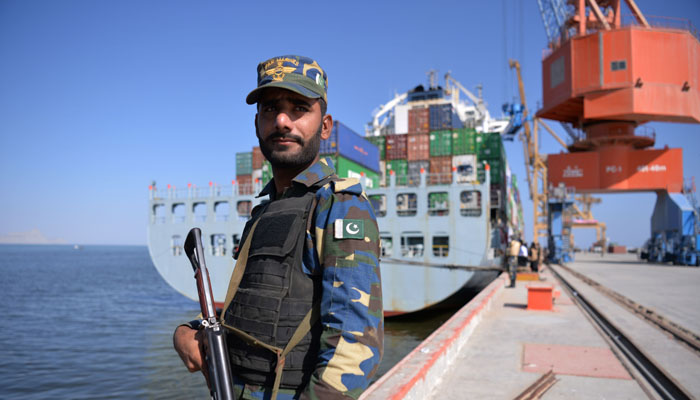China engages Baloch militants for CPEC security: FT
Three people with knowledge of the talks told the UK financial daily that Beijing had been in direct contact with militants in Balochistan, where many of the scheme’s most important projects are located.
China has been quietly holding talks with Baloch separatists for more than five years in an effort to protect the $60bn worth of infrastructure projects it is financing as part of the China-Pakistan Economic Corridor.
This was stated in a Financial Times story published Monday.
Three people with knowledge of the talks told the UK financial daily that Beijing had been in direct contact with militants in Balochistan, where many of the scheme’s most important projects are located.
Late last month, Prime Minister Khaqan Abbasi inaugurated the Phase-I of Gwadar Free Zone and the first-ever international expo in the coastal city in a bid to woo investors from all over the world.
Chinese officials did not comment on the talks, however, in an interview with BBC Urdu earlier this month, Chinese Ambassador to Pakistan Yao Jing had said that the Baloch militants are no more a threat to Pakistan, China and the CPEC.
“The Chinese have quietly made a lot of progress,” said one Pakistani official. “Even though separatists occasionally try to carry out the odd attack, they are not making a forceful push.”
For more than half a century, Beijing has maintained a policy of non-interference in the domestic politics of other countries. But that has been tested by its desire to protect the billions of dollars it is investing around the world under its Belt and Road Initiative to create a “new Silk Road” of trade routes in Europe, Asia and Africa.
As it seeks to boost the Chinese economy, China’s plans for a new Silk Road has pitched Beijing into some of the world’s most complex conflict zones.
Chinese peacekeepers are already in South Sudan, where Beijing has invested in oilfields and is planning to build a rail line. China has also contributed troops to a UN peacekeeping operation in Mali and even talked about launching attacks against Daesh in Iraq, where it has been the largest foreign investor in the country’s oil sector.
Some have warned that China’s investment could lead to Pakistan being treated like a client state by Beijing, despite promises that Chinese troops would not be stationed there.
Pakistani officials, according to the FT, have welcomed the talks between the rebels and Chinese envoys, even if they do not know the details of what has been discussed.
“Ultimately, if there’s peace in Balochistan, that will benefit both of us,” said one official in Islamabad.
Also, the recent US policy towards Pakistan has convinced many in Islamabad that China was a more genuine partner, the report added. “[The Chinese] are here to stay and help Pakistan, unlike the Americans, who cannot be trusted,” the person said.
One provincial tribal leader said many young men had been persuaded to lay down their weapons by the promise of financial benefits.
“Today, young men are not getting attracted to join the insurgents as they did some 10 years ago,” he said. “Many people see prosperity” as a result of the China-Pakistan corridor, he said.
-
Global memory chip crunch puts spotlight on Apple; Will iPhone become more pricey?
-
Bitcoin plummets toward $60,000 as investors dump risky bets
-
Bitcoin crashes below $63K as regulatory pressure and market fears grow
-
Bitwise Crypto Industry innovators ETF: What investors should do in 2026?
-
Nintendo shares slide again as momentum fears grow
-
Gold, silver prices fallen sharply; What’s driving the drop?
-
Gold’s record climb: Experts question if its safety is ‘overstated’
-
Dubai unveils plans to construct street built with real gold












